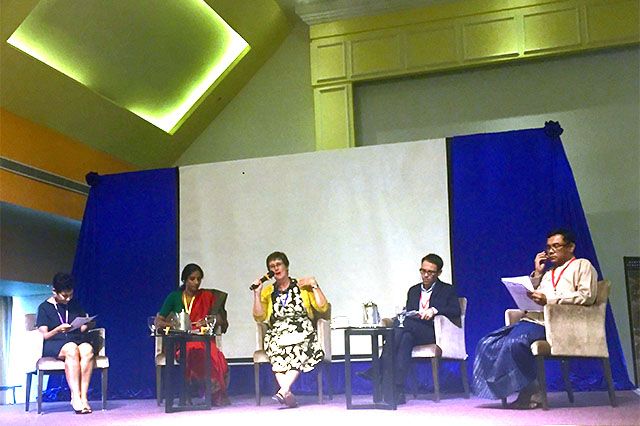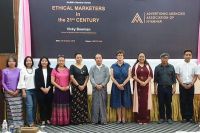Governance of Corporate Philanthropy

Myanmar Centre for Responsible Business (MCRB) convened a responsible business seminar on Thursday October 24 to share experience on governance of corporate philanthropy.
The seminar was attended by around 70 participants from Myanmar and foreign companies and those who advise them, government representatives, regulators and (I)NGOs. It was supported by Chevron, H&M, Coca-Cola, and Total and is the fifth such seminar, held in cooperation with DICA in support of their commitment to responsible investment. Speakers shared experience on governance of company foundations and how businesses could ensure donations are made in a transparent way and do no harm, as well as the current regulatory landscape concerning tax and philanthropy.
Welcoming participants, U Thant Sin Lwin, Director General of the Directorate of Investment and Company Administration (DICA) said that the Myanmar Government hoped for responsible investment which was both profit-oriented and concerned with social welfare and supporting Myanmar’s fulfilment of the Sustainable Development Goals (SDGs). He noted that donations are an integral part of Myanmar society and that Myanmar people place a high priority on individual giving and volunteering. However, he clarified that the Myanmar Investment Law, and the Myanmar Investment Commission do not require investors (foreign or Myanmar) to spend a percentage of their profits on philanthropy. Rather, the MIC encourages investors to consider the many different ways in which their businesses can enhance the welfare of the Myanmar people and deliver ‘responsible and inclusive investment’. He noted that philanthropy, including partnerships with organisations which are working directly for public welfare, was just one way to achieve this. But above all such investment was achieved through the way a company does its core business. This includes direct and indirect creation of quality jobs, training and skills transfer, and paying taxes. He reminded investors to ensure that they are obeying all Myanmar laws and permit conditions, respecting human rights, avoiding and minimizing negative environmental and social impacts and not engaging in corrupt practices. As with all other company activities, he notes that when it comes to deciding corporate philanthropy strategies, the Myanmar Companies Law applies. Directors, whether they are making decisions about corporate philanthropy, should therefore ensure that they are fulfilling their duties as a company director. They should ensure that it benefits Myanmar society, ‘does no harm’ and does not undermine the Myanmar Government’s fight against corruption.
Dee Bourbon, Asia Pacific Social Performance Advisor from Chevron explained that for Chevron, one of the co-sponsors of the event, corporate responsibility, covers a range of environmental, social and governance (ESG) issues that matter to their stakeholders and business. Corporate philanthropy is an element of that. While some companies have separate foundations, other companies do not, and instead have community investment programmes as part of their investment, or focus less on donations and more on CSV ‘Creating Shared Value’. Some do all three. But the one thing they all have in common is that they care about good corporate governance.
The presentation by Vicky Bowman, Director of MCRB, elaborated on the legal, tax and policy environment for philanthropic giving in Myanmar. These included 2016 the Myanmar Investment Law, and 2017 Rules, Rule 196 of which requires companies with MIC Permits to submit an annual report on how they have done business responsibly. The corporate governance/directors’ duties requirements of the 2017 Companies Law/2018 Rules are relevant including for ensuring business integrity of donations.
Notification 14/2018 from the Anti-Corruption Commission gives guidance to companies on managing corruption risk. Tax deductibility of donations has been clarified in Internal Revenue Department Practice Statement 2/2018. Other relevant guidance includes the NLD’s 2016 Code of Conduct for Gifts which inter alia highlights that public servants are not allowed to accept gifts with a value of more than K25,000 – and IRD Practice Statement 1/2018 clarifies that these are not tax deductible.
Vicky noted that the 2016-17 Myanmar Extractives Industry Initiative report discloses that social expenditure by oil, gas and mining companies was over USD 11 million. However, the bulk of this expenditure is voluntary not mandatory. Building on the comment from DG Thant Sin Lwin, Vicky explained that the only Myanmar legal requirement for social expenditure/ community donations is section 56 of the 2019 Gemstones Law which requires 2% of a company’s investment amount to be paid to State/Regional governments for spending in accordance with the guidance of the local MP. This represents a significant corruption risk. Recently the Sagaing Government had started to require applicants for small scale mining permits to make a 400,000 MMK contribution to a township ‘CSR Fund’, but this appears to have no basis in law. It is also a corruption risk. (As an aside, she noted that it would be more correct to term such funds ‘community development’ funds rather than ‘CSR’ which was defined by the EU in 2011 as ‘the responsibility of a business for its impacts on society’).
Finally, Vicky highlighted the current context of corporate philanthropy in Myanmar which had received increased attention following the 5 August report of the UN’s independent Fact-Finding Mission. This had raised questions about the governance and purpose of donations by companies in Myanmar to the crisis in Rakhine State. She noted that Amnesty International had earlier targeted the donation made by Myanmar Brewery/ Kirin, which had responded with an overhaul of governance of MBL’s donations.
Dr Ruth A. Shapiro, Chief Executive of Hong Kong-based Centre for Asian Philanthropy and Society (CAPS) presented CAPS’ Doing Good Index (DGI) first published in 2018 which looks at the enabling environments for philanthropy and private social investment across 15 Asian countries, including Myanmar. The DGI report measures four different areas including tax and fiscal policy, regulatory regimes, socio-cultural ecosystems and government procurement. She noted that Myanmar (and Indonesia) scored poorly ‘Not Doing Enough’ on these issues in the 2018 Index. This might seem counterintuitive as Myanmar and more recently Indonesia feature highly in the annual World Giving Index of the Charities Aid Foundation. This could be explained by the difference between ‘charity’ and ‘philanthropy’. Charity refers to giving money to charity as “a spontaneous act of giving” whereas philanthropy is “an organized systemic mechanism to bring about structural change.” The CAF polls people to ask if they have given money in the last month; this is a practice common in Myanmar. However, CAPS’ study was focussed on structured donations through philanthropy. More widely, the report disclosed a general lack of trust in giving donations in Asia. For the Second DGI, where CAPS is partnering with MCRB, online surveys have been conducted with 105 Myanmar not-for-profit ‘social delivery organisations’ as well as government officials and experts. It will be published in early 2020.
Building on Vicky’s comments about the risks of mandatory company donations, Ruth explained the Indian approach in which the top 12,000 companies by revenue, are required by the 2014 Companies Law to contribute 2% of their pre-tax profit to certified non-profit-organisations. At least one woman has to be involved in the decision- making process. This had resulted in many companies establishing their own Foundations, a growth in consultants for philanthropy, and the establishment of a Prime Minister’s and nowadays increasingly Chief Ministers’ funds which carried corruption risks. Another consequence was unequal distribution; companies tended to donate to places where their activities are based, which leaves a large number of underdeveloped states without any assistance. Currently there is a controversial debate in India about making non-compliance a criminal offence.
Ruth’s presentation also included examples of Asian corporate philanthropy, but also of shared value strategies: Siam Commercial Bank (SCB), in addition to offering financial support requires beneficiaries to do a diagnostic to determine where exactly these NGOs need technical assistance, (e.g. accounting, digital marketing, etc.) and assign an employee to support them. An example of shared value was Manila Water Company Inc who employed poor local people to ensure that one of the main water pipelines going from the city to the outskirts was not being siphoned off – this had been a win-win situation. In Myanmar, Shwetaung was given as an example of traditional corporate philanthropy (donations only), and Yoma as ‘DIY’ philanthropy, in which the company delivered and installed the goods (solar lighting).
Chevron, H&M and Coca-Cola made presentations on the governance of their corporate philanthropy. In her presentation, Yin Myo Su @ Misuu, explained why she established Inle Heritage Foundation to safeguard and preserve the environment surrounding Inle Lake. While initially intended as a private foundation funded by donations from her hotel profits, the drop-off in tourists had required her to seek funds from others, which was why she was now more focussed on governance and transparency.
In polling by Mentimeter, 64% of seminar participants said that companies should not be required by law to make donations, 30% through they should, and 6% weren’t sure. 48% thought that education should be top priority for corporate philanthropy, 23% environment and 14% health. It was noted that donations to environmental causes were not currently tax deductible under the 2011 Income Tax Law. 55% thought that companies should not donate to support religious causes, 36% that they should (9% Don’t Know). 80% of participants thought that companies should not donate to political parties. 11% said they should (9% Don’t Know).
Two international NGOs World Vision and PACT made presentations on how they were working with Myanmar and international companies. Areas of commonality between the company and NGO speakers were the need for each side to do due diligence on the others, the need for alignment of mission, and sustained partnership, and the problem of misaligned deadlines.
In the panel discussion which focussed primarily on tax deductibility of donations, U Tet Htut Aung, Director of the Yangon Large Taxpayer’s Office outlined Internal Revenue Department Practice Statement 2/2018 and encouraged those who still needed guidance after reading this to contact IRD’s Taxpayer Services Section at the LTO or Taxpayer Services Units in the individual tax office. He noted IRD’s experience of auditing some companies had led to some donations being disallowed. This included money to officials, unrecognised charities (although there was not complete clarity on what was a recognised charity as MoPF had not issued a list), donations for traditional festivals and to golf courses, and money thrown to the crowd at umbrella hoisting ceremonies since this could not be accounted for. He also referred to the charitable exemptions in Section 9 of the Special Goods Tax Law, and Section 7 of the Commercial Tax Law. He also mentioned that IRD’s Technical Review Committee is working on guidelines on ‘CSR expenditure’, to interpret S.6d on charitable exemptions and S.11 on deductions of expenses of the Income Tax Law (ITL). These would be permitted ‘only for CSR approved by the government’. He said that the drafters of the new ITL were aware of certain issues and that these were addressed in draft Law and specifically Section 5 and 23, available on the IRD website.
Romaric Roignan, Country Manager of Total E&P Myanmar explained how Total had approached philanthropy and what he saw as the operational and relationship benefits. TOTAL’s programmes include a long-term partnership with Helen Keller on preventing blindness, and with Suu Foundation on road safety, as well as local community development around the pipeline during its 25 years in Myanmar. Their activities are agreed by the joint venture partners including Myanmar Oil and Gas Enterprise (MOGE) and are declared as expenses for the purposes of determining taxable income, and audited. To date there have been no disputes with IRD on this. He noted that their approach was governed by Do No Harm and was therefore constantly reviewed – for example earlier provision of free medical care in communities had been rethought when it was discovered to have led to an exit of private sector healthcare providers.
Araddhya Mehtta, Country Director, ActionAid Myanmar underlined the importance of tax rather than philanthropy as the most source of funding for social services and development (in earlier Mentimeter polling 75% of the audience had chosen tax as the most important contribution to sustainable development in Myanmar, over 25% who chose company donations). She noted that Myanmar currently has the lowest tax revenue as a percentage of GDP in the ASEAN region, and questioned the impact of investment tax holidays and tax incentives for donations. In conclusion, the panelists, including Dr Ruth Shapiro, agreed on the importance of corporate governance of donations, and aligning incentives and approaches between the private sector and NGO partners so that they are mutually beneficial and ensuring that tax reform supported sustainable development through both increased tax revenue and well-governed philanthropy.
Previous responsible business seminars have addressed responsible business due diligence (July 2018), Decent work: Employment, working conditions, industrial relations and unacceptable forms of work (September 2018), and combatting corruption (December 2018) and Diversity and Inclusion (May 2019).
 English
English မြန်မာ
မြန်မာ မြန်မာ (unicode)
မြန်မာ (unicode)








